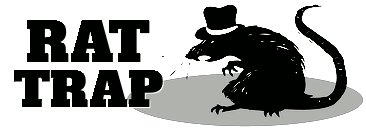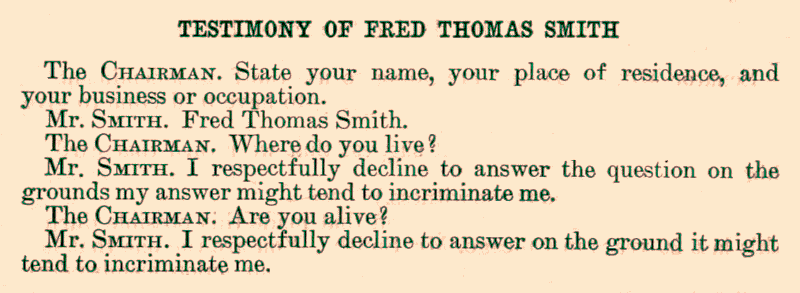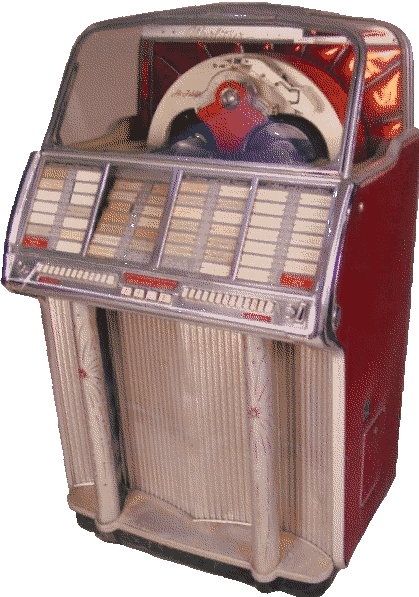
Coin-operated jukebox machines were once found in every diner, tavern and pool hall in the country. Jukeboxes filled with hundreds of record discs allowed patrons to play their favorite music whenever they wanted for as little as a dime. Jukebox vendors and business owners split the revenue fifty-fifty. The city of Chicago alone had more than a hundred commercial jukebox vendors operating over 10,000 machines during the 1950s heyday. It was a cash-only business generating millions in revenues that naturally attracted organized crime's attention.
Union leader Fred "Jukebox Smitty" Smith dominated the jukebox industry in Chicago. Called the Outfit's "most accomplished extortionist," Smith bullied and brutalized his way into orchestrating a massive industry shakedown that lasted decades and made him and his associates rich.[1]
But Smith had another side known only to the Federal Bureau of Investigation - he was a confidential informant. When the FBI was still in the dark about certain aspects of the Outfit, Smith identified members, outlined the organization's racket territories and solved mob murders. His cooperation is revealed here for the first time, along with highlights from his debriefing sessions with federal agents.

Union boss
Born in 1904 to an Irish mother and a German-born father, Fred Thomas Smith grew up in Chicago and joined the Teamsters union.[2] Smith got his underworld start in the 1930s, working for Eddie Vogel, an Al Capone-era gangster. Vogel was a power in the vending machine business, controlling Chicago's most extensive jukebox and cigarette routes.
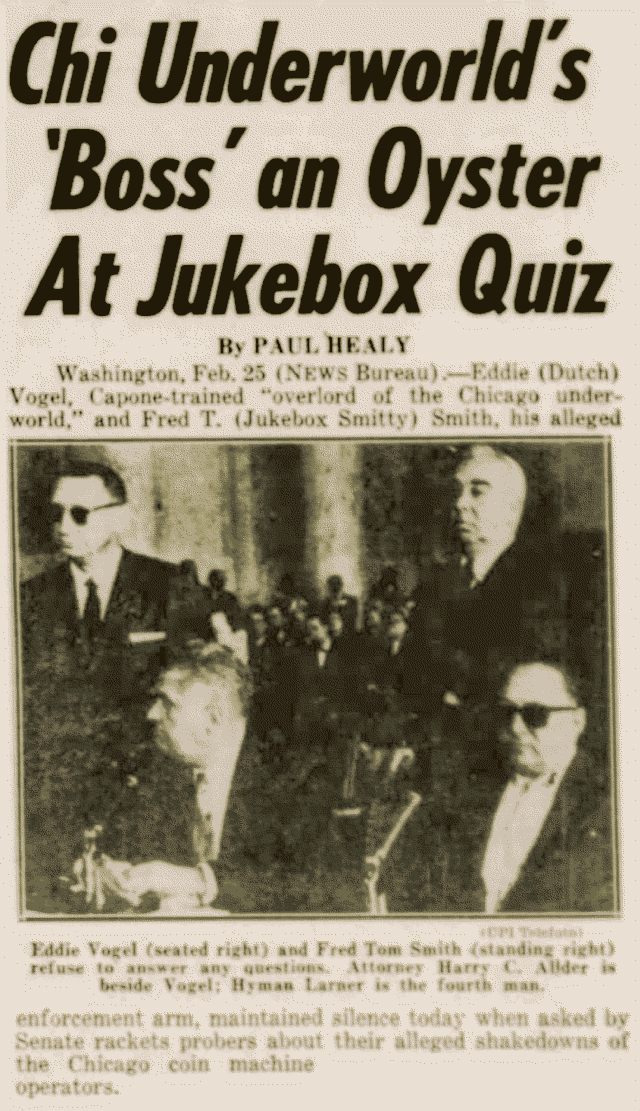
NY Daily News
Feb. 26, 1959
In 1940, Michael Boyle, boss of the Electrical Workers Union, installed Smith as head of the union's jukebox division. Working as a business representative for Local 134, Smith introduced industry regulations that forced vendors to pay exorbitant fees or dues to operate.[3]
Vendors had to join an "association" to protect their jukebox locations from outside competition. They were required to belong to a "union" that acted as the association's enforcement arm. Smith also forced vendors to subscribe to the Commercial Phonograph Survey, a marketing and public relations firm. These fee-collecting organizations offered no real benefits or services and were designed simply to fleece the vendors.
If a vendor protested, he would lose his locations, or Smith's thugs would trash his machines or pour a drink over them to muck up the wiring. Jukeboxes were expensive to buy and repair. If Smith wanted to send a more powerful message to an uncooperative vendor, his other techniques to force compliance included dynamite blasts, acid attacks and stench bombs.
Smith maintained he and union boss Michael Boyle devised the setup to protect the jukebox vendors' interests: "Neither I nor the 'old man' have gotten a quarter from this venture."[4]
Smith's shakedown schemes were endless. Another popular scam was to force vendors to stock their jukeboxes with counterfeit or overpriced records sold from companies controlled by mobster Charles English. Smith also required them to affix to their machines "union stamps," sold exclusively by him and renewable every quarter.
Investigators determined that, between payoffs, salary kickbacks and regulatory fees, Smith and his associates split over $150,000 annually. They made a similar amount extorting game and cigarette vending machine operators.
Smith resigned from the union in 1958. He later admitted to the FBI that Murray Humphreys, the Outfit's overseer of union activities, ordered him out after years of negative publicity. Smith continued to influence union policy from the shadows.
A few months after he left the union, authorities called Smith to appear before a United States Senate Select Committee on Improper Activities in the Labor or Management Field. Questioned by the committee lead counsel Robert F. Kennedy about his activities and associates, Smith took the Fifth Amendment four dozen times.[5]
In the 1960s and 70s, the jukebox industry declined with the introduction of portable transistor radios and cassette tape players, and organized crime looked elsewhere for profits.
In April 1967, the Illinois Crime Commission questioned Smith about organized crime's control of the state's vending machine business, but Smith took the Fifth Amendment twenty-three times.[6] Six months later, Smith died of a heart attack at the age of sixty-three.[7] Divorced at the time of his death, Smith was buried at Mount Carmel Cemetery in Hillside, Illinois. His cooperation with the authorities was never suspected.
Smith's importance
Smith (along with informer Theodore DeRose) provided the FBI with its first comprehensive Outfit membership list in 1964. This demonstrated Smith's importance to the FBI's intelligence-gathering capabilities and helped offset the FBI's failure to develop an Outfit member-informant.[23]
In other crime families, Mafia member-informers usually provided this Intel by this time.
Proof of Smith's cooperation
1. Fred Smith was identified in FBI documents as a confidential informant.[24]
2. Smith shared a similar profile to the informant described in the intelligence report, "FBI, 'CG 6729,' Chicago Office, report no. 92-689-111, March 12, 1964." Like Smith, the informant was a former prominent member of the International Brotherhood of Electrical Works, Local 134, expelled from the union because of negative publicity.[25]

3. By comparing Intel shared by Smith in "FBI, 'CG 6729,' Chicago Office, report no. 92-689-111, March 12, 1964," with similar Intel shared by the informant known as "CG 6729" in other intelligence reports establishes that they are the same.
Smith and the FBI
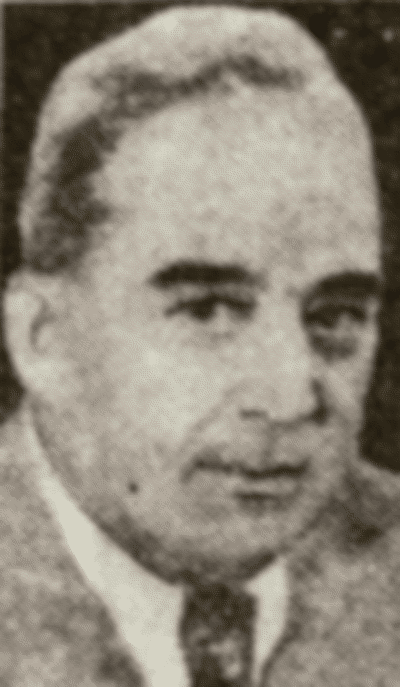
Fred Smith
The FBI was initially unsuccessful in developing a Mafia informer inside the Outfit. Unlike those in New York, Chicago's special agents did not have a "Joseph Valachi" to break down underworld hierarchy and history for them. Instead, they relied primarily on Intel gathered through listening devices and cooperative Outfit associates. Fred Smith's cooperation filled a significant gap in the FBI's intelligence capabilities. He knew the players, understood parts of the organization's activities and had personally interacted with the top leaders.
Fred Smith first met with the FBI to discuss cooperating on February 25, 1964.[8] Over the next two weeks, Smith debriefed with FBI handler Robert J. Tompkins, Jr., in multiple meetings. According to Tompkins, "very few questions were presented to the informant because [Smith] was rapidly furnishing this extremely valuable information and jumping from one subject matter to another."
There were limits on what Smith revealed, especially about his own criminal activities. Tompkins noted that Smith "has freely furnished information concerning his relatives and background to the extent of being reluctant to discuss activities at this time concerning his personal endeavours on behalf of the 'Outfit'."
It's unclear where Smith first met with the FBI, but his second debriefing was in the back seat of Tompkins' automobile. Because of his high profile, Smith expressed a fear of meeting federal agents in hotels. He demanded to meet outside Chicago, where he was unlikely to be recognized. Smith declared he would not testify under any circumstances.
After initially sitting for multiple meetings between February 25 and March 12, 1964, Smith agreed that he would make himself available for follow-up interviews. He met a few more times with federal agents before he stopped cooperating sometime in the latter part of 1964.
Tompkins and Smith created "code names" to talk safely over the telephone and to set up meetings. The FBI assigned Smith the symbol code "CG 6729" to protect his anonymity in Tompkins' intelligence reports.
The available intelligence reports do not clarify what prompted him to open up. However, one report indicated (the passage is partly redacted) that "the talk around the street" was Smith had fallen out with his underworld associates.
Smith expressed a fear for his life and warned the FBI to be careful how they used his Intel. The FBI took his safety seriously and monitored listening devices planted in mob hangouts for any chatter about Smith, but the Outfit never caught on.[9]
The FBI stated a "good portion" of Smith's disclosures were already known to them but admitted he furnished "considerable additional information which is extremely enlightening." The FBI rated him a credible source with "excellent potential."
The debriefings are fragmented and scattered, but they show Smith's understanding of Chicago's underworld as it stood in 1964. For the most part, Smith would ramble on a bit about an Outfit player he knew before moving on to the next one. Smith did not fully grasp the Outfit's activities and relationships, but his disclosures are presented here for historical interest.
Smith debriefings
- 'La Cosa Nostra'
- Fred Smith advised the term "La Cosa Nostra" was not used in Chicago. He had heard the term used recently by informer Joseph Valachi in the media but not by anyone in Chicago. According to Smith, the Chicago organization was called "Unione Sicilione," "Outfit," or "Mob." He said it was composed of Italians, mostly from Sicily and some mainlanders. According to Smith, one could become a member only after murdering someone on behalf of the organization.
-
Non-Italians like Murray Humphreys, Eddie Vogel, Gus Alex and Ralph Pierce were part of the organization but were not "members." Their ability to make money or their "proficiency" in a particular field gave them power.
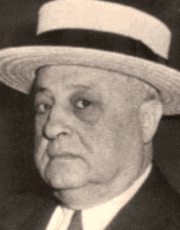
Guzik
- According to Smith, after Al Capone went to prison, the organization faltered.[10] Smith did not elaborate, but he may have been referring to a dropoff in the organization's income after Prohibition ended. In the next decade, Outfit leaders including Paul Ricca and Louis Campagna went to prison for extorting Hollywood studios.
- According to Smith, Jake Guzik and Charles Fischetti revitalized the organization as a profitable entity. Smith implied it was the ingenuity and expertise of non-Italian mobsters that put the Outfit back on solid ground. In particular, Guzik mentored and promoted mobsters like Eddie Vogel, Murray Humphreys and Ralph Pierce to become leadership figures in the rackets, despite not being full organization members. They used to be workers and thieves before Guzik helped them. Smith advised the majority of Outfit hoodlums did not want their children to enter a life of crime.
Italian mobsters
- Sam Giancana
-
Fred Smith called Sam Giancana the "recognized and uncontested head of the Chicago criminal element and is also the Chicago representative on the national 'Commission.'" Giancana took over as boss from Tony Accardo in the 1950s. However, former leaders Accardo and Paul Ricca "exercise the same position and control of Giancana, however only participate in decisions of major importance." According to Smith, Giancana personally killed Johnny Bolton, an Illinois state representative.[11]
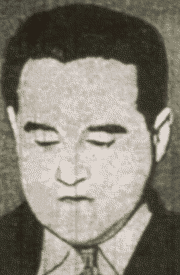
Bolton
- Mobsters reporting directly to Giancana included Butch Blasi, Rocco Potenza and Chuck Nicoletti. Potenza handled gambling operations in different parts of north Chicago and Niles, Illinois.
- Smith described Blasi as Giancana's "errand boy" who arranged his hoodlum meetings at the Armory Lounge every Tuesday. Other meeting places included the St. Clair Hotel and the residences of Tony Accardo and a mob-linked liquor businessman known as "Foggie." Giancana settled disputes and received his share of the cut, which usually amounted to half of the profits. Giancana earned so much money that he had difficulty finding suitable investment opportunities.
- Smith reported that some Outfit leaders were unhappy with Giancana and considered replacing him as boss in 1963. He said the person "next in line" to succeed Giancana was Frank Ferraro. Ferraro directed Outfit activities in Cicero, Illinois.
- Charles English
-
Fred Smith stated hoodlum Charles English was Giancana's childhood friend. English was ambitious and frequently did things to impress Giancana and gain his favor. English controlled Outfit activities in Chicago's Twenty-ninth Ward, in the Austin and Garfield Park neighborhoods.
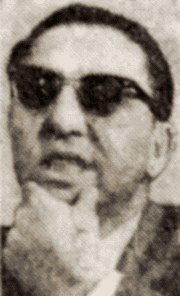
English
- Smith said Charles English paid off "on track bookmakers" at Sportsman's Park race track in the Chicago suburb of Cicero. The big bookmakers paid English "$600 a day to operate their establishment and so much money a day for each bookie under their control."[12]
- Charles English was Giancana's contact man between Chicago and the New York Mafia. If Giancana had a message for a Mafioso in New York, English delivered it. English visited New York frequently to handle business for Chicago. English tried to be very "discreet" about the trips to avoid publicity. Smith advised federal agents that English's wife had evicted him from the marital home after receiving photos of him with his mistress.[13]
- John Cerone
-
According to Fred Smith, John Cerone was "extremely ambitious" and wanted to become the organization's next boss. Cerone used his close friendship with Tony Accardo to further his ambitions.
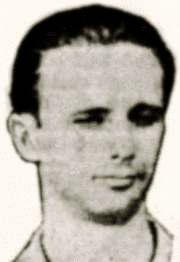
Kowalski
- Cerone got his underworld start working for "Tough Tony" Capezio. Cerone used to work "hanging sheets" (posting odds) in Capezio's old betting parlor at Chicago Avenue and Western Avenue. Cerone operated as a card dealer at Capezio's club in Cicero called the "Ship." Cerone assumed Capezio's position when he died in 1955.
- Cerone allegedly murdered John "Johnny the Pollack" Kowalski in 1945. Kowalski and Capezio operated a jukebox company together, and Kowalski allegedly cheated Capezio out of profits. Joey Glimco also complained that Kowalski was hampering his business. As a result, Accardo ordered John Cerone to kill Kowalski.
- Cerone was a playboy who enjoyed dating numerous women. Cerone partied at "The Twist Lounge" and the "Imperial Inn" with underling Joseph Gagliano.
- Brothers Nick and George Bravos operated betting parlors for Cerone. Smith advised that Nick Bravos was once kidnapped and held for a $50,000 ransom. Cerone paid the ransom and then allegedly hunted down the kidnappers and killed them.
- Cerone suffered a heart attack in the 1950s, but Smith stated that he recovered. Cerone controlled an electrical company called the Rite Lite Company, managed by his nephew. It provided Cerone with a legitimate source of income.
- Joseph Gagliano
-
Fred Smith stated he first met Joseph Gagliano and his associate Willie Messino in 1939 after the two mobsters were newly released from prison. Gagliano got his start working for Cerone at Capezio's betting parlor.
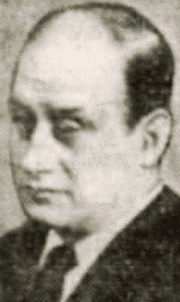
Gagliano
- Joseph Gagliano controlled a large moneylending or "juice" business but left the operation to Willie Messino. If Messino brought a problem to Gagliano's attention, his response was, "You asked for all the juice activity in my territory, now you take care of it."[14]
- According to Smith, Messino was an "extremely vicious individual, possibly insane." Chris Cardi worked as a "muscle man and juice collector" for Messino.
- Gagliano secretly owned the Commercial Phonograph Survey. Gagliano installed Smith's two brothers, Frank and William Smith, to run the company and put mobsters Willie Messino, Rocco Salvatore and Joey Glimco on the payroll in no-show jobs.[15]
- Gagliano suffered a heart attack in 1960, but Smith said he was healthy again and was an avid "Twist" dancer. (Popularized by singer Chubby Checker's 1960 hit, "the Twist" became a national sensation in 1961-62.) Gagliano dated many girls and gave them expensive gifts like jewelry. He enjoyed spending time on his yacht. He lived in a modest house, but Gagliano bragged to Smith that the inside was furnished lavishly. He owned three dogs that he called the "Gestapo."
- Gagliano lived next door to hoodlum Guido De Chiaro. The low-key De Chiaro operated a jukebox business and controlled illegal activities around Franklin Park.
- Felix Alderisio
- Fred Smith advised that Felix Alderisio and Charles Nicoletti murdered mobster Charles "Cherry Nose" Gioe. Gioe was a high-ranking Outfit member, who spent time in federal prison in the 1940s alongside Paul Ricca and Louis Campagna for extorting Hollywood studios. Outfit leaders ordered Gioe's death after he argued violently with Campagna.
- Smith described Nicoletti as a "killer" who reported directly to Giancana. Gioe's murder was allegedly Alderisio's "stepping stone" in the Outfit and led to greater responsibilities and more significant opportunities.[16]
- Before Gioe's murder, Alderisio was a partner with Bill Vassios in the 1940s. Alderisio and Vassios acted as bodyguards and errand boys for "Sugar Joe" Peskin, a big shot in the jukebox business. Alderisio was a "worker" performing errands for the Outfit that required "muscle."
- Irv Weiner was Alderisio's "principal frontman" in all his activities. Weiner began as a bondsman before Alderisio took him under his wing. Smith advised the Outfit did not wholly trust Weiner and he could see the Outfit killing Weiner at the first sign of trouble.
- Marshal Caifano
- John Cerone and underling "Smokes" Aloisio managed the bookmaking and sports betting in Melrose Park, a Chicago suburb. At the same time, Marshall Caifano and Sam Battaglia controlled all other Outfit activities.
- Smith said Caifano extorted businessman Ray Ryan. Ryan was a wealthy gambler who owned dozens of racehorses, which he raced throughout the country. According to Smith, Ryan received inside information through his connections in the industry that allowed him to bet successfully. Bookmakers accused Ryan of cheating in his gambling activities and often refused to take his bets. Years later, a car bomb killed Ryan. Informant Frank Rosenthal secretly told the FBI that the Chicago Outfit murdered Ryan.
- Ross Prio
- Ross Prio controlled Chicago's North Side with his two lieutenants Jimmy Allegretti and Joseph Di Varco. Many years ago, Prio "muscled" into the cheese manufacturing business by murdering a cheese producer. Smith referred to the cheese producer as "Bevenita," but his real name was Vincent Benevento. Benevento was a North Side gangster allegedly murdered by Paul Ricca and Tony Accardo in the 1940s.
- Smith advised that Allegretti directed Outfit activities in the Near North Side. Managing juice activities for Allegretti was Joseph Arnold. Smith described Arnold as "Italian from Brooklyn," though in reality, Arnold was Jewish.
- Smith charged that famed Chicago Police Captain Frank Pape worked for Allegretti. Smith said Pape was Allegretti's "fix man." Pape was well known for engaging and killing suspects in gun battles. Smith offered the FBI a contrary view. He charged that Pape killed unarmed suspects and then planted weapons on their dead bodies to get away with it.
- Fifi Buccieri
- Fifi Buccieri controlled "all betting on sports events in the entire City of Chicago." Buccieri secretly controlled the Angel-Kaplan Sports News Service on North Clark Street, one of the country's largest sports handicapping services. It provided sports betting lines for football, baseball, basketball and hockey games. Bill Kaplan started the business before Buccieri muscled his way in and installed Outfit gambling expert Donald J. Angelini. (Kaplan ratted out his associates in the late 1950s under symbol code "CG 6272.")[17]
- Joseph Spadavecchio, known as Joe Spa, worked for Buccieri and collected bets for him. He once beat up an individual at the Sportsman's Park Race Track over a late payment. Spadavecchio liked the nightlife and socialized with Joseph Gagliano.
- Joseph Glimco
-
Joseph Glimco, who headed up Chicago's Taxicab Driver's Union, was out of favor with Sam Giancana. According to Smith, mobster Joseph Mendino had been muscling into the jukebox industry and stepping on toes. Glimco complained to Tony Accardo and Paul Ricca about Mendino. Smith advised that Glimco "obtained his power" from Ricca.[18] Accardo and Ricca forced Mendino out of the industry. The decision allegedly angered Giancana because he was secretly in partnership with Mendino.[19]
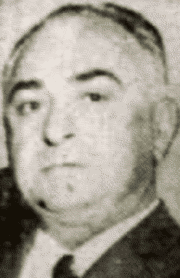
Glimco
- Glimco told Smith that Teamster boss Jimmy Hoffa ordered all his union locals to donate money to the National Association for the Advancement of Colored People (NAACP), a civil rights organization. Hoffa intended to help the organization fund civil rights demonstrations and cause trouble for U.S. President John F. Kennedy. Kennedy's brother, Attorney General Robert F. Kennedy, was Hoffa's chief political nemesis and had tried to put him in jail for years.
- Although Glimco was generally assumed to be an inducted Mafia member, Smith, a close associate for decades, did not identify him as one.[20]
- Anthony Pinelli
- According to Fred Smith, Outfit hoodlum Tony Pinelli "invented the procedure of placing slain victims in the trunk of automobiles." He added Pinelli, formerly of Gary, Indiana, had retired to California.
- Rocky DeGrazio
- Melrose Park, a Chicago suburb, was under the direction of Sam Battaglia and Marshall Caifano. The area was formerly controlled by Rocky DeGrazio, but the Outfit replaced him after he "over-extended himself in bookmaking activities." Smith described DeGrazio as a "junkie." He said DeGrazio was a "king pin in narcotics," although it was a closely guarded secret. Smith implied the Outfit's top leadership tolerated his involvement in narcotics.
- Sam DeStefano
- Smith described loanshark Sam DeStefano as a "psychopathic killer," and the most "mentally insane" individual in the organization. He reported to William Daddano. DeStefano was a sadist who enjoyed hurting people. According to Smith, DeStefano invented the "juice racket," and the practice spread across Chicago and the country. Every major hoodlum in Chicago operated his own "juice enterprises," which meant lending at weekly rates as high as 20 percent.
- In the early 1960s, Giancana ordered "juice operators" like DeStefano to lay off the violence used to collect loans because of negative publicity. DeStefano was furious and "had words with Giancana" and "told Giancana off."[21] Smith said DeStefano was the only individual in Chicago who would talk to Giancana like that. He said he wouldn't be surprised if Giancana killed DeStefano.
- Mob attorney George Bieber was an avid gambler and was deeply in debt to DeStefano. Bieber bet through a Jewish bookie connected to Lennie Patrick. Smith advised that Bieber's law office distributed the skim generated by the Outfit-controlled Dunes casino in Las Vegas.
- Americo DePietto
- Americo DePietto told Smith that his narcotics arrest in October 1963 was a "bum rap." DePietto said that when law enforcement arrested him, he "just happened" to be talking to an individual in possession of narcotics. Smith recalled that Mafia member DePietto used to be only an "on track bookie" and was not a member of the organization when he first met him years ago.
- Albert "Obbie" Frabotta
- Fred Smith advised that Outfit member Frabotta was broke and had to sell his wife's jewelry to raise money. Frabotta was formerly a close partner with Felix Alderisio, but they had fallen out and were bitter enemies.
- Frank La Porte
- According to Smith, Outfit big shot Frank La Porte was a notorious killer. He allegedly killed for the first time at age sixteen. La Porte controlled everything in Chicago Heights and west to Joliet, Illinois.
- Francis Curry worked for La Porte in Joliet County. Curry had a farm next to Outfit leader Paul Ricca. Smith claimed Curry gained his power because of his friendship with Ricca.
- Rocky Infelise
- Smith advised that mobster Rocky Infelise was run out of Chicago around 1960 because he had sizeable unpaid gambling debts on horse racing. He hid out in New York City.
Non-Italian mobsters
- Murray Humphreys
- Murray Humphreys directed all union activity on behalf of the "Outfit." Smith described Humphreys as the "sharpest and most intelligent of all the Chicago hoodlums." Labor leaders Gus Zapas, head of the Cleaners union, and Michael Boyle and Mike Kennedy from the Electrical Workers Union, answered to Humphreys.
- Gus and Sam Alex
-
Gus Alex controlled Outfit activities in Chicago's First Ward with the assistance of Pat Marcy. Marcy and John D'Arco operated an insurance company that businesses in the area were compelled to patronize.
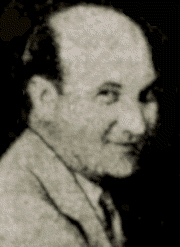
White
- Smith called Gus Alex's brother Sam a "professional killer." Sam lived on a Michigan farm. He got his start in the Outfit under Willie Heeney, a former Capone aide and gunman.
- According to Smith, Prohibition-era gangster "Big Dave" Earsman murdered labor leader Tommy McElligott in the basement of Chicago's Staley's Restaurant. Rivals "Three Fingers Jack" White and George Barker paid Earsman for the killing. Gus Alex's brother Sam later murdered White.
- Buster Wortman
- Outfit leader Sam Giancana "controlled" gangster Buster Wortman. Wortman oversaw a large territory in East St. Louis and Peoria, Illinois. Smith said Wortman retained control of his domain by killing all his competitors. Former St. Louis gangster Peter Licavoli allegedly relocated to Detroit "mainly because of the vicious killings on the part of Wortman."
- Wortman spent time in prison for bootlegging. Years ago, Wortman told Smith that he intended to kill Bernie Shelton, a former associate, Wortman blamed for his conviction. Shelton was later killed, although Smith was unsure who was responsible.[22]
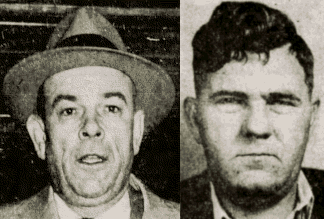
Wortman and Shelton
- Edward Vogel
- Eddie Vogel, according to Smith, had retired from the rackets recently. He sold his interests, including the vending machine business Apex Amusement Corporation, to his friend and business partner Gus Alex. Smith said Alex and the Outfit split the income from these rackets. Vogel was reportedly Smith's underworld sponsor for thirty years. Vogel's retirement may have played a part in Smith's decision to cooperate.
- Ralph Pierce and Leslie Kruse
- Jewish mobsters Ralph Pierce and Leslie Kruse were longtime criminal partners. Kruse's specialty was setting up and operating large gambling parlors. Smith stated Pierce had only gained wealth very recently despite being in the Outfit for years.
- According to Smith, Pierce's underling Pepe Posner murdered Irving Vine, the ex-husband of Humphreys' wife. After the murder, Posner left town until the investigation wrapped up.
- Smith told the FBI that Capone-era hoodlum Sam "Golf Bag" Hunt and Pierce used to bet heavily on the ponies. Hunt's gambling addiction got so bad that Outfit leader Paul Ricca threatened to kill Hunt if he didn't give it up.
- David Yaras
- David Yaras and Lennie Patrick controlled Outfit activities in Chicago's Twenty-fourth Ward or Rogers Park-area. Bookie Davy Miller formerly ruled Rogers Park until Yaras and Patrick killed two of his men and forced him out. Benny Goldberg worked for Yaras and Patrick and controlled bookmaking activity from his suite at the Sovereign Hotel. The Outfit killed former alderman Benjamin Lewis for not "cooperating." Smith advised that Detroit hoodlum Joe Massei used Yaras to kill people.
- Joseph Corngold
- Fred Smith stated Joseph Corngold oversaw Outfit investments in Arizona. Every month, Corngold traveled to Chicago and delivered investment profits to Hy Godfrey. Godfrey then passed the proceeds to Frank Ferraro, the "head man" in Cicero and the Outfit's "bookkeeper." Ferraro was a close associate and childhood friend of Gus Alex.
Notes
Thank you to Richard Warner for making available an FBI intelligence report.
1 "'Juke' stamps held as phony as a $3 bill," Chicago Tribune, Aug. 8, 1960.
2 United States Census, 1930. Smith's father, Frank Joseph Smith, was born in Frankfurt, Germany. When Frank immigrated to the United States, he listed his parent's ancestry as German despite having an English surname.
3 "Glimco named as boss in coin box rackets," Chicago Tribune, April 1, 1960.
4 "Operators tell of payoffs to run juke boxes," Chicago Tribune, April 3, 1950.
5 "Testimony of Fred Thomas Smith," Feb. 25, 1959, Improper Activities in the Labor Field, Part 47, Hearings Before the Select Committee on Improper Activities in the Labor or Management Field, U.S. Senate, 85th Congress, 2d Session, and 86th Congress, 1st Session, Washington, D.C.: U.S. Government Printing Office, 1959, p. 17163-17168.
6 "Answers are all the same," The Daily Chronicle, April 17, 1967.
7 Illinois, Archdiocese of Chicago, Cemetery Records, 1864-1989.
8 FBI, "CG 6729," Chicago Office, report no. 92-689-111, March 12, 1964; FBI, "CG 6729," Chicago Office, report no. 92-1322-30, March 26, 1964.
9 FBI listening devices, referred to as confidential sources CG 6568 and CG 6715, revealed no threat to Smith's life.
10 According to Smith, Capone's brothers John and Ralph Capone were broke and had no connection to the Outfit.
11 Bolton's widow was Marie Fanelli, the daughter of Outfit member Rocco Fanelli.
12 FBI, "CG 6729," Chicago Office, report no. 92-1322-30, March 26, 1964.
13 FBI, Samuel Giancana, Chicago Office, June 26, 1964, NARA Record No. 124-10195-10078.
14 FBI, "CG 6729," Chicago Office, report no. 92-1322-30, March 26, 1964.
15 "'Mob' enforcer gunned down in N.W. Side alley," Chicago Tribune, April 4, 1978. Unknown shooters murdered Frank Smith in 1977.
16 Edmond Valin, "The Italian mobster who wasn't," Rat Trap, October 2020. Outfit snitch Theodore DeRose stated another Alderisio murder was behind his rise in the underworld.
17 FBI, Murray Humphreys, Chicago Office, Oct. 1, 1964, NARA Record No. 124-90059-10078.
18 FBI, Samuel Giancana, Chicago Office, Sept. 6, 1966, NARA Record No. 124-10198-10112.
19 FBI, Samuel Giancana, Chicago Office, July 27, 1964, NARA Record No. 124-10195-10100.
20 Another Outfit informer from the same period, Theodore DeRose, also omitted Glimco. However, later Outfit member-informants identified Glimco as a member.
21 FBI, Samuel Giancana, Chicago Office, July 27, 1964, NARA Record No. 124-10195-10100.
22 "Conviction of Charley Harris brings end to 20-year ear of fear, hate and vengeance in Pond Creek Bottoms area," St. Louis Post-Dispatch, Nov. 7, 1965; "Gangster hiding from police when fatally stricken," St. Louis Post-Dispatch, Aug. 5, 1948. The Shelton brothers were a prominent Prohibition gang in Wayne County, Illinois. The different brothers were wiped out in separate shootings over the years, although Wortman was never charged. Bernie Shelton murder suspect Frank Eppelsheimer died of a blood clot in Wortman's home.
23 FBI, La Cosa Nostra, New York Office, Aug. 21, 1964, NARA Record No. 124-10205-10471.
24 FBI, Murray Humphreys, Chicago Office, Oct. 1, 1964, NARA Record No. 124-90059-10078.
25 FBI, "CG 6729," Chicago Office, report no. 92-689-111, March 12, 1964, p 14;
